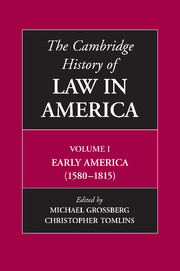Book contents
- Frontmatter
- 1 Law, Colonization, Legitimation, and the European Background
- 2 The Law of Native Americans, to 1815
- 3 English Settlement and Local Governance
- 4 Legal Communications and Imperial Governance: British North America and Spanish America Compared
- 5 Regionalism in Early American Law
- 6 Penality and the Colonial Project: Crime, Punishment, and the Regulation of Morals in Early America
- 7 Law, Population, Labor
- 8 The Fragmented Laws of Slavery in the Colonial and Revolutionary Eras
- 9 The Transformation of Domestic Law
- 10 Law and Religion in Colonial America
- 11 The Transformation of Law and Economy in Early America
- 12 Law and Commerce, 1580–1815
- 13 Law and the Origins of the American Revolution
- 14 Confederation and Constitution
- 15 The Consolidation of the Early Federal System, 1791–1812
- 16 Magistrates, Common Law Lawyers, Legislators: The Three Legal Systems of British America
- Bibliographic Essays
- Notes on Contributors
- Index
10 - Law and Religion in Colonial America
Published online by Cambridge University Press: 28 November 2008
- Frontmatter
- 1 Law, Colonization, Legitimation, and the European Background
- 2 The Law of Native Americans, to 1815
- 3 English Settlement and Local Governance
- 4 Legal Communications and Imperial Governance: British North America and Spanish America Compared
- 5 Regionalism in Early American Law
- 6 Penality and the Colonial Project: Crime, Punishment, and the Regulation of Morals in Early America
- 7 Law, Population, Labor
- 8 The Fragmented Laws of Slavery in the Colonial and Revolutionary Eras
- 9 The Transformation of Domestic Law
- 10 Law and Religion in Colonial America
- 11 The Transformation of Law and Economy in Early America
- 12 Law and Commerce, 1580–1815
- 13 Law and the Origins of the American Revolution
- 14 Confederation and Constitution
- 15 The Consolidation of the Early Federal System, 1791–1812
- 16 Magistrates, Common Law Lawyers, Legislators: The Three Legal Systems of British America
- Bibliographic Essays
- Notes on Contributors
- Index
Summary
English religious conflict influenced law in the early British colonies; so too, however, did commercial ambition and English legal traditionalism. That inherently unstable combination produced significant reconfigurations in the eighteenth century, when religion became less obviously formative and public in relation to law, but no less intermeshed with legal culture and political conflict. Protestants in America reenacted many Old World religious conflicts as they struggled to integrate commercial gain, the coercions of law, and the promise of Christian freedom – or, put differently, as they sought the right relation between the City on Earth and the City of God. Their various solutions to that Augustinian dilemma took widely different forms.
In England Tudor political skill had, for a time, muted religious tension. Church and commonwealth became a single all-enveloping unity. That unity, however, masked both Catholic resentment and mounting Calvinist pressure to distinguish the church from the realm – to “gather out” and purify the true church of the redeemed. Early Stuarts exacerbated these tensions exactly when England was extending commercial ventures into America. Protestants feared the Catholic leanings of the Stuart kings, and Archbishop Laud’s persecution of dissenters coupled the Church of England with Stuart assertion of unlimited prerogative. Puritans, viewing Christ (and the free consent of believers) as the only true source of church authority, denounced a hierarchical Anglican episcopacy rooted in Crown prerogative. Meanwhile, lower ecclesiastical courts, charged with enforcing morality, veered from laxness to corrupt and discretionary intrusiveness. Their disrepute was almost matched by that of English law, with its capriciously enforced multitude of capital crimes.
- Type
- Chapter
- Information
- The Cambridge History of Law in America , pp. 324 - 364Publisher: Cambridge University PressPrint publication year: 2008
- 3
- Cited by



